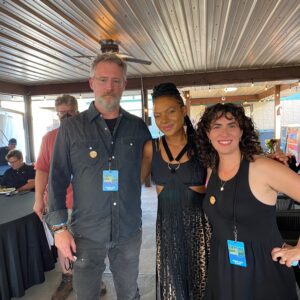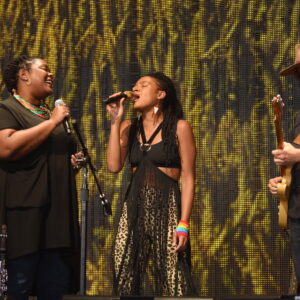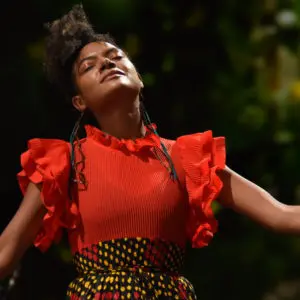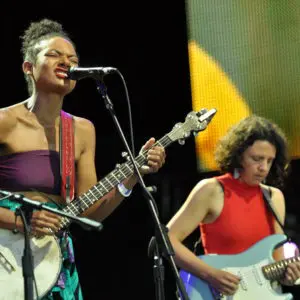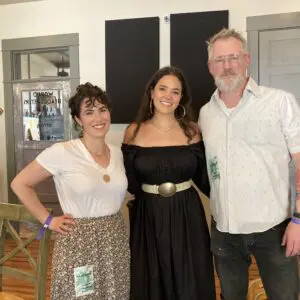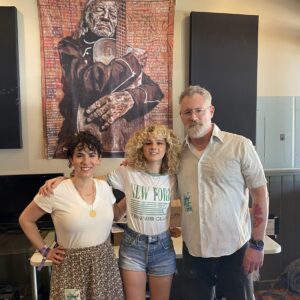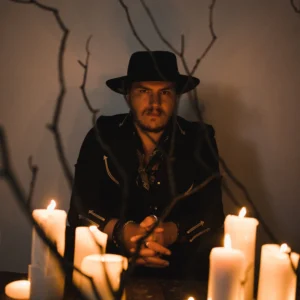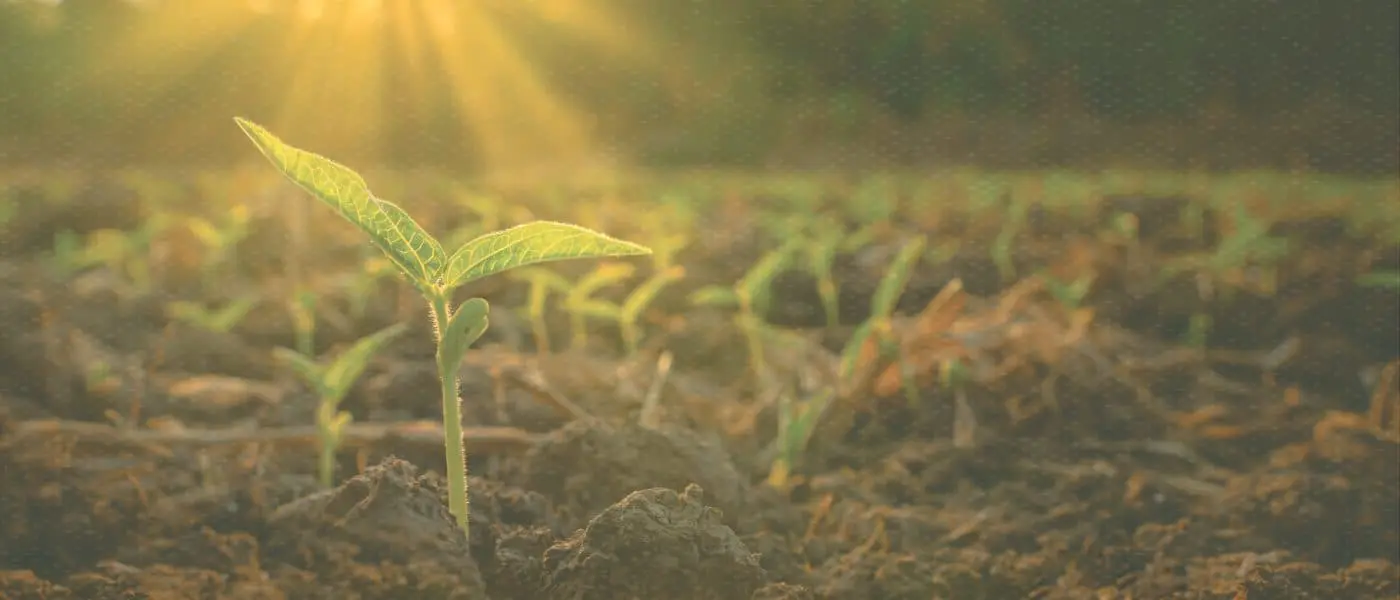In this episode of Against the Grain’s new series on artists and activism, we zero in on a subject that has come up in all of the previous episodes – artists catching flak for taking a public stand on an issue. We’ll hear from Allison Russell and Grace Bowers on issues that should not be controversial – school shootings and voting – as well as from Emily Nenni and Dylan LeBlanc, two more thoughtful young artists trying to lead with compassion and humanity in a world of social media haters. Taylor Swift gets a special mention, and not just for the title of the episode!
Listen to the episode below. And, make sure to subscribe in your podcast app of choice!
Companion Video Playlist
Watch artists featured in this episode in this video playlist!
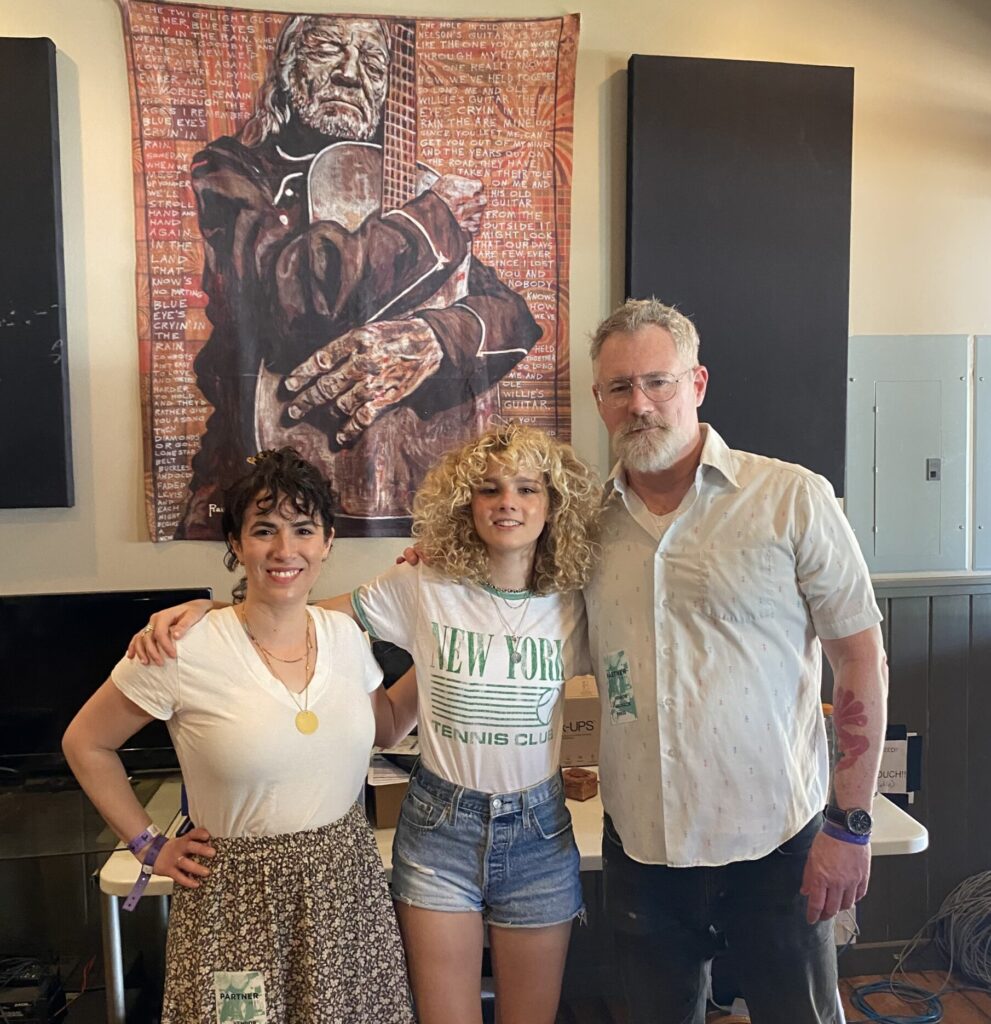
Grace Bowers
Grace Bowers is an 19-year-old, award-winning guitarist, singer/songwriter and bandleader who is undisputedly on a meteoric rise. Her debut album, Wine On Venus, was produced by John Osborne (Brothers Osborne), released independently and garnered widespread acclaim, Forbes praised it as, “an infectious, joyous party” and Rolling Stone calling Bowers “Nashville’s new guitar hero.”
Bowers cut her teeth playing in dive bars, inspired by the blues of B.B. King as well as the soulful funk of Sly And The Family Stone. Her breakout moment came when videos of her playing guitar on social media went viral during the pandemic. She has since become one of the most in-demand and celebrated young guitarists, and an inspiration to a whole new generation of women around the world.
Grace recently performed at the 67th Annual Grammy Awards with Chris Martin (Coldplay) and at Love Rocks NYC with Peter Frampton and Trey Anastasio at the Beacon Theater. She was awarded the Variety Next Gen award at their annual Hitmakers event in Los Angeles. She also made her late-night television debut on “Jimmy Kimmel Live!,” was featured on “CBS Mornings”, “The Late Show with Stephen Colbert” and NPR’s “All Things Considered,” and toured this past year with The Red Clay Strays, Gary Clark Jr., Slash and The Roots. She has further headlined sold out shows in Japan, New York City, Los Angeles and beyond. She has also appeared at prominent festivals such as Bourbon & Beyond, Telluride Blues and Brews, Bottlerock, Sea.Hear.Now., Pilgrimage Music & Cultural Festival and “Let Freedom Sing” Nashville’s 4th of July concert.
If that was not enough, Grace recently won Instrumentalist of the Year at the 2024 Americana Music Association Honors & Awards, made her Grand Ole Opry debut on her eighteenth birthday, and was named a U.S. Global Music Ambassador by the U.S. Department of State and YouTube’s Global Music Diplomacy Initiative. She also performed alongside Dolly Parton on CBS, joined Lainey Wilson as part of CBS’ New Year’s Eve Live celebration, and been sought after by everyone from Tyler Childers and Susan Tedeschi to Remi Wolf, Mt. Joy and All-American Rejects. She is perhaps most proud of raising $30,000 with her 2nd Annual “Grace Bowers & Friends” benefit show, $15,000 of which was donated to MusiCares®.
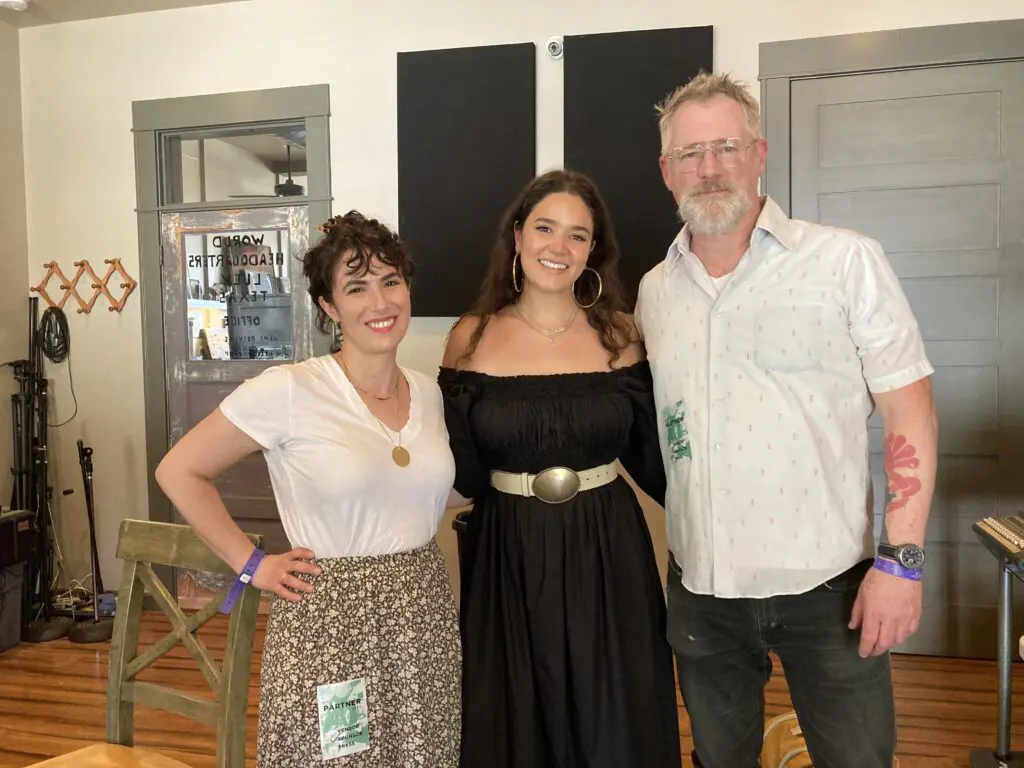
Emily Nenni
Emily Nenni has a confession: she didn’t always plan on being a performing artist. “I thought I was just going to be a songwriter,” she admits. Clearly, life had something else in store. The singer and guitarist has emerged as one of the freshest and most electrifying voices in Nashville, with a sound rooted in classic honky-tonk and spiked with serious country, soul and rock ‘n’ roll fire, and sweet-and-sassy lyrics that chronicle hard living, hot nights, heartbreak and other universal truths about the human condition. Over the past several years she’s enraptured audiences across Music City with sizzling sets in smoky bars and clubs, honing her command of the stage, perfecting her skills as a band leader and sharpening an already astute world view, all of which are on full display on her newest studio album, Drive & Cry.
The record is a marked departure from her previous full-length, 2022’s celebrated On the Ranch. Whereas that effort saw Nenni uproot herself to lend a hand – and write – while assisting at a ranch in southern Colorado, Drive & Cry drops the listener smack in the middle of her boisterous and bustling Nashville world. The album kicks off with “Get to Know Ya,” a honky-tonk rave-up that celebrates the end of the work day and the beginning of a music-filled, come-what-may night. Nenni busts out her biggest hoops, jumps into the jeans she can “really only stand up in,” and heads to the local bar. “Play ‘til the sun’ll come / when the daylight’s done,” she sings as the instrumental accompaniment races in step behind her.
From there, Nenni leads into “Greatest Hits,” a pedal-steel-inflected Dolly Parton-style number in which she tips her hat to underground honky-tonk venue Santa’s Pub, a dive bar squeezed inside a double-wide trailer that has become her home-away-from-home in Nashville. “When I first came to town, I was 21 and singing at clubs with folks who were twice my age,” Nenni recalls of moving to Music City from her native California. “Then a buddy of mine said, ‘There’s a place where people are making this music that are actually your age, and where you’d really fit in.’ And that was Santa’s Pub. It’s where I learned that music doesn’t have to be perfect – everybody is just having fun and there’s no judgment. You can show up however you’re feeling that night, have a good time and be surrounded by friends.”
A stellar cast of those friends stepped up to assist Nenni on Drive & Cry, beginning with producer John James Tourville of New West labelmates the Deslondes. “He brought in half the musicians and I brought in half,” Nenni says. “And he gave me so much space to make the record that I wanted to make.”
It’s a record that is her most personal to date. Save for an album-closing cover of Terry Allen’s classic “Amarillo Highway” (a staple of her Sunday-night sets at Santa’s), Nenni penned the remainder of the dozen tracks entirely on her own. “It’s the first time I’ve done that,” she says. “I had a few weeks alone at my house in Nashville, and I just sat with all my thoughts and feelings from the last couple years and put it all down. So this is an album that’s truly ‘me.’ ”
The results put the full range of Nenni’s singular musical voice on display, from the soaring “Changes,” influenced by her love of Sixties girl groups, to the swampy, strutting empowerment anthem “I Don’t Have to Like You,” in which she declares “I’m a grown-ass woman and I don’t trust a word you coo.” There’s also the Tina Turner homage “I Don’t Need You” (“Got my own boots to fill and you know I will,” Nenni assures), the wistful, late-night honky-tonk ode “We Sure Could Two Step,” and the playful title track, in which, over a tight country-funk groove, Nenni jokes, “Don’t you worry ‘bout me / I’m gonna have a bawl.” It’s a lighthearted lyric, but one that is, like everything on the album, true to Nenni’s life. “I do actually cry a fair bit, and I love to do it while I’m driving,” she admits.
Nenni will have plenty of opportunities for that in the near future, as she plans to take Drive & Cry on tour, far and wide. “I love to be on the road,” she says. “I love to be with my buds, I love to play shows, and I love to make people happy and make people cry with my music. That’s what truly makes me happy, too.”
Nenni laughs. “So I maybe never thought I’d be a performer, but I sure am glad that I am.”
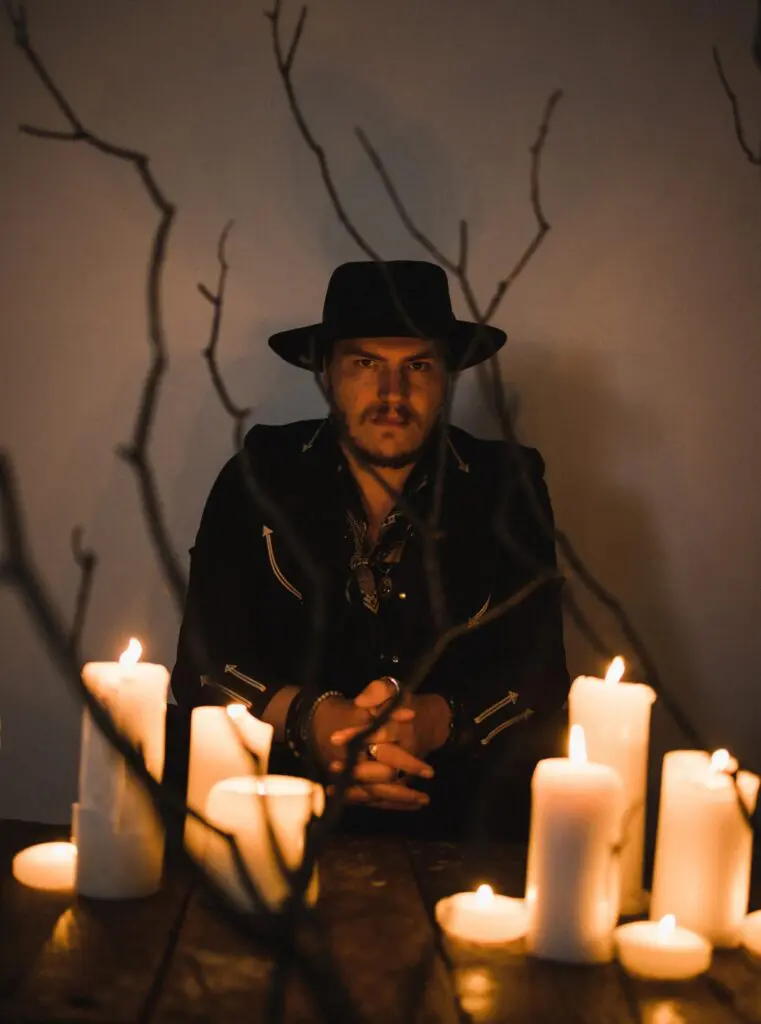
Dylan LeBlanc
Dylan LeBlanc is a singer-songwriter and multi-instrumentalist who often finds himself flirting with the edge — or “dancing on a razor,” as he calls it — as it is all he has ever known. A verdict vagabond since he was a little boy tossed between Texas, Louisiana and Alabama, LeBlanc thrives on the precipice, never staying in one place for too long. It is that nomadic spirit that drew him not only to a life as a touring musician, but also to the beast that titles his newest record: ‘Coyote.’
LeBlanc says he has always related to the insatiable, scavenging nature of the wily coyote. Much like the animal, LeBlanc is a wanderer who knows when to trust his instincts, musically and otherwise. It is a spiritual kinship that runs deep, but he credits one particularly hair-raising face-to-face instance with solidifying his bond with the animal.
LeBlanc was in Austin, Texas, climbing the face of a 100-foot cliff, gambling with Mother Nature’s good graces as he pulled himself up by tree branches. Once he reached the top, all that laid ahead of him was a lush treeline. There was a breath of stillness, then the sound of a thunderous rustling that drew closer and closer to him. In a blink, LeBlanc watched as a frenzied raccoon came speeding out of the treeline, trailed by an animal that stopped and stared at him with striking intensity: a coyote.
“We’re looking at each other dead in the eyes…and I’m saying — out loud — ‘If it’s you or me, I am going to kick you off the side of this cliff. I’m not going down.’ It was intense, this human-animal moment,” LeBlanc recalls. “I’ve never forgotten that… he was just trying to survive and so was I.”
‘Coyote’ is LeBlanc’s first self-produced release, boasting a cherry-picked lineup of what he calls “killer session players,” such as drummer Fred Eltringham (Ringo Starr, Sheryl Crow), pianist Jim “Moose” Brown (Bob Seger), and bass player Seth Kaufman (Lana Del Rey). Though ‘Coyote’ covers familiar ground for LeBlanc of living on the edge of danger and its many consequences, the record is both autobiographical and a concept album built around the character of Coyote, a man on the run.
LeBlanc has seen shades of a life not unlike the character of Coyote. He, too, strayed from the straight and narrow and sparred with managing anger in his adolescence. Just as the brutal truth of “Hate” describes that the most gnarled parts of Coyote were molded by his harrowing experiences, it is something LeBlanc feels is universal, as hate does not discriminate.
“I went to school with people from all walks of life. We were different, but we thought, ‘We’re all poor,’ so we’re all in the same boat. We all grew up in chaos. It was the ‘90s in Louisiana on the border of Texas… that air was thick, man. Sink or swim type of mentality.”
LeBlanc is the first to warmly acknowledge his rough edges and tendency to chest-up to conflict, both the result of the volatility and instability of his youth. Now, no longer a boy who always had to be on alert and ready to defend himself, LeBlanc recognizes that his roots do not define or limit the man he is today.
Considering the distinct wisdom and lifetimes in his voice, it is no surprise that LeBlanc has known hardships, but he is a shining example of what beauty comes from perseverance. LeBlanc’s tenacity has paid off in spades, leading him to a record deal with ATO Records, releasing the critically acclaimed ‘Renegade’ in 2019, and now ‘Coyote,’ which LeBlanc says is “the record he has always wanted to make.”
Now in his thirties with a fiancé and a daughter he adores, LeBlanc is the closest he has ever been to the man he has always strived to be. With endearing candor, he confesses he is still learning to be less hot-headed and more gentle; but he doesn’t think about dying every day, like he used to. LeBlanc credits fatherhood for the perspective he has now on what matters, and his key concern is remaining devoted to those he loves most. Though far removed from a perilous life like Coyote’s, LeBlanc admits he still feels as if he is dancing on a razor’s edge all the same. The goodness he is surrounded by only gives him more to lose, with each glimmer carrying an asterisk of fear. One misstep and he worries that it all could vanish, but the lionhearted LeBlanc seems to forget he once unnerved even a wild coyote with his eyes alone.
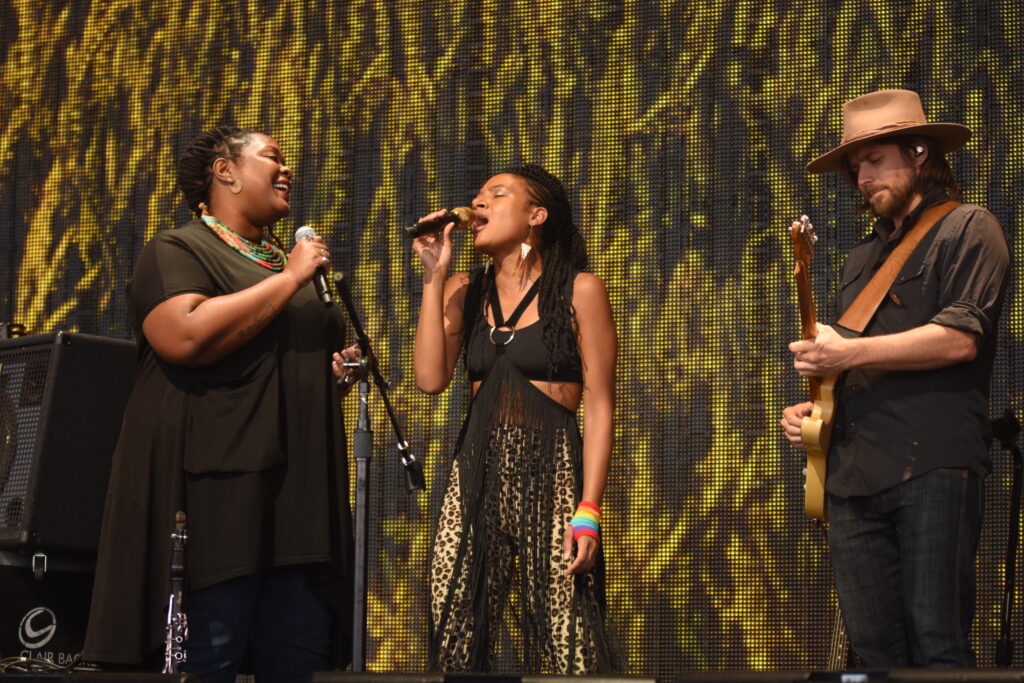
Allison Russell at Farm Aid 2023. Photo © Brian Bruner / Bruner Photo
Since the release of her first solo album four years ago, the self-taught singer, songwriter, poet, activist, and multi-instrumentalist Allison Russell has redefined what artistry means in the 21st century. Outside Child, her often devastating, deeply moving, cathartic celebration of survivor’s joy, has become one of the most acclaimed albums of the past 10 years⎯(various honors include three GRAMMY Award nominations, the Juno Award for Contemporary Roots Album of the Year, the 2022 Americana Music Association’s Album of the Year Award, two International Folk Music Awards, three Canadian Folk Music Awards, and four UK Americana Music Awards).
The Returner, Russell’s sophomore album, is a body-shaking, mind-expanding, soulful expression of Black liberation, Black love, of Black self-respect. This new album doesn’t just deliver on the massive promise of the last two years, it brilliantly exceeds all reasonable (and unreasonable) expectations and affirms Allison Russell’s place among music’s most vital artists⎯and The Returner as one of 2023’s most essential recordings. Alongside the Rainbow Coalition Band – a talented ensemble of BIack and POC, queer, and historically marginalized musicians from across the U.S. – Russell uses the power of music in order to spread her message of the “Beloved Community” and is dedicated to lifting others upwards as her own star climbs higher.
Episode 4: Haters Gonna Hate
KURN: Welcome back to Against the Grain: The Farmaid podcast. In this special series, we’re talking to artists about how they navigate social and political issues as musicians, citizens, and neighbors. I’m Jessica Ilyse Kurn.
FOLEY: And I’m Michael Stewart Foley. Something that’s come up in our conversations with artists over the last two years is how some of them have been taking stands on the issue of gun violence. Few artists have been as outspoken on this subject as Farm Aid board artist Margo Price, who lives in Nashville, where the Covenant School shooting happened in March 2023.
KURN: Margo took a very public stand, supporting state representatives Justin Jones, Gloria Johnson and Justin Pearson, the so-called “Tennessee Three,” who had led a protest within the House chamber in the wake of the Covenant shooting. This led to Jones and Pearson being expelled from the legislature, though voters later returned them to their seats. Actually, we spoke with Justin Jones last season, so you can listen to that interview on our website, Farmaid.org/podcast.
FOLEY: In the intense aftermath of the shootings, Margo joined Sheryl Crow, Emmylou Harris and a handful of other artists at protests and performances in support of gun control in Tennessee. Margo wrote movingly of her family’s experience in the wake of the shooting in Rolling Stone magazine.
KURN: The country music industry in Nashville was shockingly quiet in the aftermath of the shooting, despite some of its biggest stars calling for reform. Against this backdrop, we interviewed another Nashville-based musician, Alison Russell.
RUSSELL: For me as a parent that Margo and I have both been feeling so intensely and so front line of our kids wake up from nightmares thinking they’re going to be shot to death at school, the statistics support their fear. It’s happening in our community. It’s happening around the country. It’s a real thing. We live in a country where the number one killer of our kids is gun violence and And we have overwhelmingly a political party that wants to tell us that it’s people that kill people, not guns that kill people. Like, yeah, that’s true, sure, and we’re not doing anything about the health crisis and mental health crisis either.
FOLEY: One person who has tried to do something about gun violence and in fact took deliberate steps to do so following the Covenant School shooting. Is the young guitar phenom Grace Bowers.
BOWERS: Yeah, my name is Grace Bowers and we are in Texas at Willie Nelson’s ranch.
FOLEY: You may know about Grace’s meteoric rise to become “Nashville’s new guitar hero,” as Rolling Stone called her. She’s just 19 years old, but she started playing guitar about ten years ago and became a kind of pandemic superstar when videos she posted from home went viral in 2020. Over the last few years, she’s toured extensively with her band, the Hodgepodge, and played loads of festivals all over the country and beyond.
KURN: We were eager to chat with this young artist because she’s willing to take a public stand on issues that matter to her. Sort of like Willie Nelson, seeing a problem in America’s heartland and starting Farm Aid, Grace wanted to raise money for the Covenant School and the Music Cares Foundation following the shooting in 2023.
BOWERS: I started the first benefit show I did. It’s called Grace Bowers and Friends, um, when I was 16 and it was after the Covenant School shooting and I lived like 20 minutes away from it so like we, it, it shook Nashville like just entirely and again I was 16 like I can’t vote. I can’t really do much to. Change that and it feels like you know that that sucks and especially like I, I came from California I grew up there so just the attitudes about those kinds of issues are very different than they are in Tennessee and that frustrated me and I’m like I’m gonna do something to help out and even more so like I had people online telling me to like shut up about it and just play music and all that and that fueled me more. Um, so I did it and the first time it was just a bunch of like local Nashville friends and we did it at Basement East which is like there were like 500 people there so it was on the smaller side of things, but we raised like $20,000 for the school and I never intended on like it becoming a thing but after that I’m like this should be like a yearly thing so now um you know I’m already planning the next one we’ve done two so far. Uh, it’s also cool because like I’ve never had to like set up a concert like that before with a lineup and all all that stuff so it was a cool like learning experience and for a good cause, but yeah like I really like especially as a young person believe in doing what you can to make your voice stand out.
KURN: It’s both surprising and maybe not so surprising that raising money for a school community devastated by a mass shooting would prompt a backlash, but apparently it did, so I asked her about it. You mentioned
KURN ON TAPE: some of the, you know, like just shut up and sing type of thing. Does the, does that affect you?
BOWERS: Yeah, I mean it made me really mad like it pissed me off. I’m like you can’t. I don’t know. I just feel like it’s not anyone’s right to be telling me to shut up, um, like whether I was talking about something political or not like you don’t say that to someone, um, and I, I was told a lot more than just to shut up and I’m not gonna I probably can’t repeat what I was told but uh just like nasty nasty things that really like disappointed me, um, over an issue that like I believe in is like pretty common sense and I I guess it’s not but. Um, it is a motivator for sure, like in all aspects, even if it’s not political or for a cause, like if someone’s gonna tell me not to do something, I’m probably gonna wanna do it even more.
FOLEY: This is one case where you really appreciate the rebellious attitude of a teenager. Right?
KURN: If you look at photos or video of Grace performing live, you’ll see she always wears a guitar strap that spells out the word VOTE in vertical letters.
BOWERS: I, uh, first got that strap from um Ketch from Old Crow Medicine Show at a festival in like Knoxville or something. And I forgot to bring a guitar strap and he handed me that one and I was like I need to find out who made this because it was it was a cool strap uh and then the girl like uh she hand makes them and she ended up making me one. And um I’ve just, I’ve worn it ever since, even though like it’s not voting season anymore. It’s still, it looks cool and I still think the message is important, so I’m not gonna take it off.
FOLEY: Everyone complains about low voter turnout in this country, particularly among young people. So you think that Grace would be universally celebrated for that vote guitar strap, right?
BOWERS: I’ve also gotten lots of negative comments on it too. But like more so they’re positive and I love that. Yeah, see that’s so weird to me. They’re like, take the vote strap off, don’t tell me what to do. I’m like, I, I didn’t say anything, OK.
FOLEY ON TAPE: Right, the most basic responsibility of the citizen,
BOWERS: Yeah. It is shocking like the comments I will get from the guitar chef alone. Like it’s actually crazy.
KURN: It’s worth pausing here to point out the elephant in the room: social media. It’s the medium where Grace and others get the most pushback. It’s very different from a dynamic back in the day where people could call into a radio station to voice their opinion. On social media, people, whether fans or haters, or, as we’ve seen, even the President of the United States, all feel very comfortable criticizing an artist for speaking out, and often in the most strident and sometimes frightening ways. Next up, we’ll talk with another artist originally from California, now based in Nashville, Emily Nenni.
FOLEY: Join us for Farm Aid’s annual festival on Saturday, September 20th at Huntington Bank Stadium in Minneapolis, Minnesota. This all day celebration of music and farmers features a unique lineup of artists and genres along with delicious family farm foods and our homegrown concessions. Join us to celebrate Farm Aid’s 40 years of standing with family farmers. Head to www.farmaid.org/podcast.
NENNI: I am Emily Nenni. I’m playing Luck Reunion today. Very excited to be here.
FOLEY: Emily Nenni is one of those artists who once you hear her, you start telling all your friends about her. She’s got a distinctive voice that reminds me of the country music stars of the 1960s and 1970s. We were delighted to hear that she was playing with our friend Steve Earle, who you heard in the first episode of this series, and we’re lucky to get a little time with her. She shared some thoughts on what it’s like to be an artist performing in such polarizing times.
NENNI: I think just lead with compassion and empathy. I think that’s what every single person can do and do more and be inclusive and Yeah, just allow everyone to be themselves and and be inviting. It’s a huge part of why I’m here today. I found the right people who didn’t make me feel like I wasn’t good enough or that I was a slow learner when it came to Being a live performer or writer, and yeah, you don’t have to make a replica of anything. You make your own music and with your own people, but just yeah, being inclusive and compassionate goes such a long way. It’s so important and kind of rare, unfortunately.
FOLEY: And not only that, we’ve seen a concerted effort to push back against the very ideas of inclusion and empathy. Which seems weird when it’s what most of us teach our kids. It’s what Sesame Street teaches our kids, Mr. Rogers.
KURN: Absolutely, that’s the main lesson in my household. But even Sesame Street is under attack these days. Emily has gotten grief for leading with compassion and humanity.
NENNI: Yeah, I’ve seen some, or I was told about some comments saying, “I like Emily’s music, but she’s too woke” or something like that. And I said, Well, honestly, that’s a compliment and sad for you that you said that. But, but yes, of course. Yeah, for closed-minded folks, I do get pushed back. But I kind of invite it because it makes, it reminds me that I’m doing what I’m intending to do. I mean, even on my social media, just post-election, I reposted something that this lovely coffee. had put outside their shop that just said, you know, pro-trans, pro-black, pro-brown, pro-pretty much everything.
And, uh, the pushback was, well, then that means you’re anti-straight. No, I didn’t say that. I just, uh, want everyone to feel safe and welcome to be allowed to live the life that they want to live. And I don’t see why that has to be so hard. Yeah, it shouldn’t be a battle. I want everybody at my shows to dance with who they Want to and dress how they want to and feel welcome and feel safe. And because I know what it’s like, you know, a woman going out at night, or whoever feeling, you know, you got to watch where you are, watch who you’re around.
I understand that there is that fear. I know. I notice I’ll lose, you know, 100 followers in a day from just posting one thing and that’s OK. It’s not that important. I just want to be able to speak freely about compassion and empathy, which, yeah, should just be baseline.
KURN: Can you imagine if folk singers like Joan Baez or Bob Dylan had social media in 1963? All of the hateful comments they would have received immediately after performing at the March on Washington…the landmark event on the question of inclusion.
FOLEY: Yeah, it took a lot more effort for people to sit down, write a letter, buy a stamp, mail the letter than some haters surely did. But I imagine it was far fewer than the number of people who can, in the blink of an eye, use their phone to fire off their judgments on social media from pretty much anywhere and remain anonymous. Next up, we talked to another young artist who has given us a lot of thought, Dylan LeBlanc.
KURN: Your donation to Farm Aid strengthens family farmers so they can thrive and keeps them on the land where they belong. Together, we can make a real difference in our farm and food system. Head to FarmAid.org/podcast to make a gift today.
LEBLANC: I’m Dylan LeBlanc. uh, I’m a singer-songwriter from Muscle Shoals, Alabama, and, uh, here at Luck Reunion.
KURN: One of the things we’ve come to love about Luck Reunion is getting to talk with people like Dylan, Emily Nenni and Grace Bowers, all young artists on the rise who are thoughtful, not only about their art and music, but also about how they engage with the world. Dylan was especially insightful in talking about the perils and pitfalls of artists using social media.
LEBLANC: Well, I’m one of those people that I save my opinion within the songs. I don’t spread a lot of political or social issue opinion on social media, uh, and the reason why is because I feel like so many people do that. I just kind of save it for the music and, uh, let that be my voice.
FOLEY: It turns out that even if you say nothing on social media, the criticism comes anyway.
LEBLANC: I did get a lot of, you know, people getting angry at me, especially during the Black Lives Matter movement because I wasn’t saying anything. And really it wasn’t for any other reason than like what am I gonna offer up, you know, that other people haven’t already offered up. Of course I’m from, you know, a predominantly African American community. I grew up with, I have cousins that are, you know, half African American and I mean, when I, I, I, for me to speak on a political issue, I have to make sure. That I’m doing it for the right reasons. I see a lot of virtue signaling because I know some of these people and I’m not, I won’t ever name names, but you know I think a lot of people do it because it’s the cool thing to do and it’s the trend and not I’m not about that, you know, I’m only gonna speak when it’s necessary and, uh, if I really feel like I need to speak up like you know, and obviously if I see something terrible happening I’m gonna step in the way of it.
I can’t sometimes do the whole. Jump on board because it’s the cool thing to do. I mean, obviously you wanna be a good person and you wanna say the things that need saying I’m saying that like I think for me personally I save it for the music. I let my songs speak for themselves and I let, I let my opinion be known that way and I just think it’s classier that way, you know, for me personally and I’m a listener.
FOLEY: Really thoughtful, right? But you can also hear in Dylan’s voice, how hard it is for him as an artist to have to navigate major issues on social media. He’s clearly reflected on this a lot before we ever sat down with him.
LEBLANC: I believe that like in this world, there’s so many people that just automatically they get mad. And because they’re passionate about what they believe in, but when you get angry, you, you lose your capability to listen and you also need to if you’re gonna educate people who need educating, you can’t do that through anger you only cause more division and I’ve seen it with my own eyes, uh, you know, I grew up in the South, of course I’ve seen racist people, but I’ve also seen racist people get educated and changed their mind through nothing more than love. And tolerance, you know, we bleed red, man. You know, we put our, we’re doing the same things we’re all just trying to get along in this world the best way we can and so I’ve seen that happen through love and understanding. I have never seen it happen through an angry tweet. And if I have something to say, I wanna be standing right in front of you and I want you to look me in the eyes and I want you to say what you have to say to me and then I’ll say what I have to say to you and maybe we can find some common ground there and and maybe we won’t, you know, but at least we will be in an honest space where, you know. You can say what you want, you know, but we need to talk it out. I’m not gonna do it from behind a fucking keyboard.
KURN: We asked Dylan to elaborate a bit on the issues he does cover in his music, where he’s letting the music speak for him instead of posting on social media.
LEBLANC: Well, obviously I, I. I think that it’s too hard to get into this country. I think people who are seeking political asylum, you know, the hoops that they have to jump through and how expensive it is for the people who are just trying to find a better way of life. I talk about that a lot of my music. I talk a lot about drug. Issues because I’m, you know, I’ve struggled with drug and alcohol abuse, uh, so that’s a huge issue in my music. I talk about, um.
You know, people feeling different or you know or whatever or you know I wanna create music that gives people a safe environment to be exactly who they are and that’s what I think a good world looks like is a people feeling safe and secure enough to be who they are as long as they’re not hurting anybody else which you know what I’m talking about they’re not hurting anybody else and I, I that’s what I, that’s what I’m down with, man, you know, I want everybody to feel that. Uh, and if you don’t feel that, then there’s something wrong and it needs to be addressed in, you know, the correct way, and I talk about that in my music, you know, and, uh, and I will continue to speak about that in my music. If I don’t say it online, you know, it’s there in the music. If you just listen and you know, and you pay attention, you’ll hear it.
KURN: We didn’t plan it that way at all, but both Dylan and Emily Nenni talked about wanting their shows to be a safe place for people to be themselves.
FOLEY: That feels so fundamental, but because we can criticize every damn thing and immediately on social media, it’s a whole new world for artists who want to make a positive impact in the world. At the same time, Dylan did express appreciation for the artists who have the biggest platforms and the longest reach for standing up about issues that are important to them.
LEBLANC: Now I’m not a huge artist either, you know, I mean, so what I say doesn’t really matter, but what I do think it’s cool when like, you know, people like on huge platforms like Taylor Swift and, you know, the artists who really can make a difference, that’s cool. And, uh, and I don’t think they’re virtue signaling because they will have to. They’re already there and they just stand for the right things and. And I get it, man. I, I, I believe in that and I think they really believe in what they’re doing. Uh, I actually really like Taylor, you know, she’s done some cool things over the years and really spoke out for the, you know, generations like me because I’m an artist that depends on touring. You know, streaming matters for me and I remember her speaking out to Apple when they were gonna do the free trial in that 3 month period and she was like, hey, uh, no, you know, it’s not about me it’s about the guy who just put out his first record and the girl who just got her first song recorded and the people who are just now getting started or whatever, you know, and I thought damn that’s cool and they changed their policy and if more people would do that and have the balls to do that like Taylor.
Things would change and that girl’s got more balls than I mean any I mean she’s for real. I like her come in I’m all about it. I’d stand behind that any day of the week.
KURN: Little shout out to Taylor Swift there, who, like Bruce Springsteen, has drawn sharp criticism from people in power, including the President, but stuck her neck out anyway. If you’re an up and coming artist though, like a lot of the artists we’ve spoken to for this series, it sure is complicated.
FOLEY: Standing up to say you want to see an end to school shootings or that you just want to create space for people to be who they want to be, dance with who they want to dance with, that shouldn’t draw pushback because no one’s forcing anyone to go to a show or to listen to their music. It’s all optional people. True,
KURN: But as Dylan points out, it’s not like they’re trying to be cool, jumping on some virtue signaling bandwagon. They don’t have to do any of that. From young new artists to legendary artists, they’re all voicing their opinion in song and in public statements because they know it’s the right thing to do.
FOLEY: In our next episode, we’ll talk to some farm aid artists about climate change and climate solutions. Does caring about community, about the environment, about life on this planet make you a political artist?
NELSON: The soil is the most fundamental source of life and you know it’s so much deeper than politics. It’s so much more cosmic than that, more existential than that.
KURN: That was Micah Nelson. We’ll talk to him and his brother Lukas, as well as Alison Russell next time, so don’t miss it. Is there something you want us to cover in the future? Send us an email or drop a comment. You can email us at podcast@farmaid.org and find us on social media, which is at Farmaid on Instagram, Facebook, threads, and now on BlueSky.
FOLEY: And don’t forget YouTube, where you can watch almost 40 years of performances and other content. Let your friends know about Against the Grain. We’re beyond grateful when you listen, share, like and subscribe to this podcast.
KURN: Against the Grain was written and produced by us with sound editing by Endhouse Media and direction from Dawn Sarokin. And thanks to Micah Nelson for our awesome theme music.
FOLEY: Thanks so much to all the artists who took the time to speak with us. Head over to our website to watch videos, check out those playlists, and learn more. www.farmAid.org/podcast. And thanks to all the farmers out there. We’ll chat with you next time.
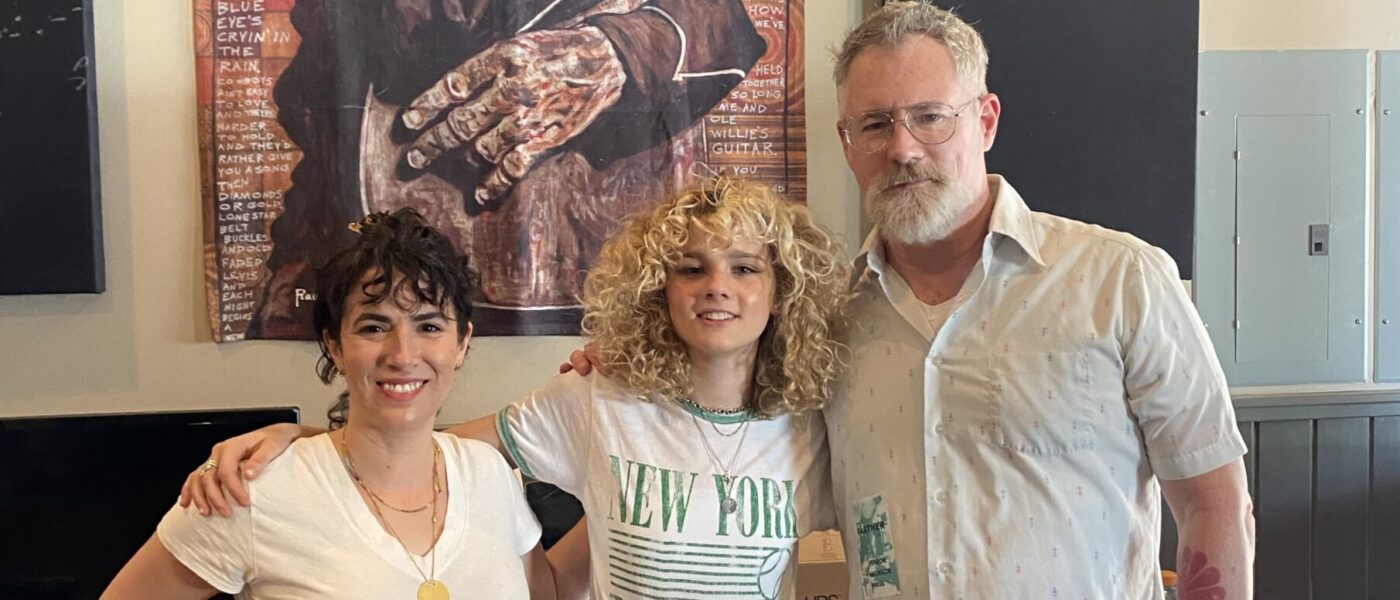
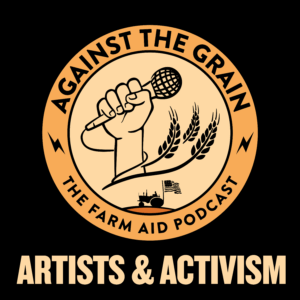 Listen to the Artists and Activism series of Against the Grain: The Farm Aid Podcast to hear from more than two dozen artists who use their art and voices as vehicles for political engagement and expression on issues that matter to them.
Listen to the Artists and Activism series of Against the Grain: The Farm Aid Podcast to hear from more than two dozen artists who use their art and voices as vehicles for political engagement and expression on issues that matter to them.

